
The punk subculture includes a diverse and widely known array of ideologies, fashion, and other forms of expression, visual art, dance, literature, and film. Largely characterised by anti-establishment views, the promotion of individual freedom, and the DIY ethics, the culture originated from punk rock.

Hardline is a deep ecology subculture that has its roots in the vegan straight edge hardcore punk scene. It is commonly seen as a more extreme version of straight edge. From its outset, Hardline adherents put out statements and literature pushing a biocentric view of the world, which advocated for militant veganism, animal rights, anti-abortion, anti-homosexuality, and a much more militant version of the straight edge philosophy, which advocates for a no alcohol, no drugs, no tobacco lifestyle. The Hardline worldview has been described variously as ecoauthoritarian and ecofascist in nature. Nonetheless, Hardline co-founder Sean Muttaqi adamantly rejected racism even while sending mixed signals about fascism.
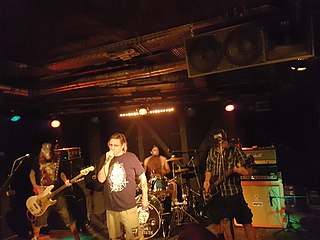
MDC is an American punk rock band formed in 1979 in Austin, Texas, subsequently based in San Francisco, and currently Portland, Oregon. Among the first wave of bands to define the sound and style of American hardcore punk, MDC originally formed as The Stains; they have periodically changed the meaning of "MDC", the most frequent being Millions of Dead Cops. The band's lyrical content expresses radical left political views and has proven influential within the punk subculture.
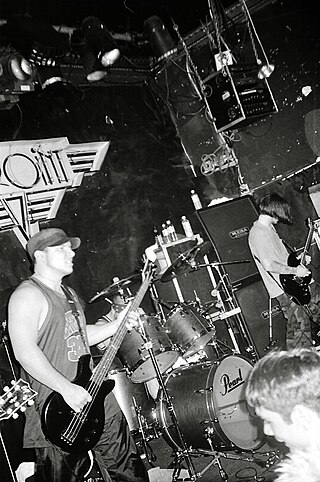
Earth Crisis is an American hardcore punk band from Syracuse, New York, active from 1989 until 2001, reuniting in 2007. Since 1993 the band's longest serving members are vocalist Karl Buechner, lead guitarist Scott Crouse, bassist Ian Edwards and drummer Dennis Merrick. Their third and current rhythm guitarist Erick Edwards joined the band in 1998.
Youth crew is a music subculture of hardcore punk, which was particularly prominent during the New York hardcore scene of the late 1980s. Youth crew is distinguished from other punk styles by its optimism and moralistic outlook. The original youth crew bands and fans were predominantly straight edge and vegetarian or vegan.

Youth of Today is an American hardcore punk band, initially active from 1985 to 1990 before reforming in 2010. The band played a major role in establishing the "Youth Crew" subculture of hardcore, both espousing and evolving the philosophies of the straight edge and vegetarian lifestyles.
Judge is a New York hardcore band formed in 1987 by Youth of Today guitarist John "Porcell" Porcelly and former Youth of Today drummer Mike "Judge" Ferraro.
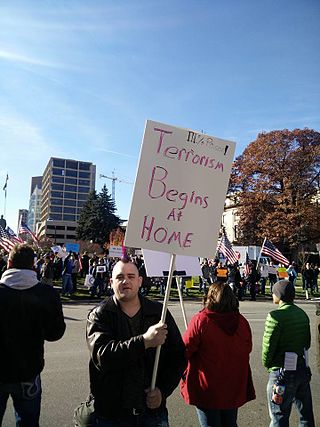
Punk ideologies are a group of varied social and political beliefs associated with the punk subculture and punk rock. It is primarily concerned with concepts such as mutual aid, against selling out, hierarchy, white supremacy, authoritarianism, anti-consumerism, anti-corporatism, anti-war, imperialism, conservatism, anti-globalization, gentrification, anti-racism, anti-sexism, class and classism, gender equality, racial equality, eugenics, animal rights, free-thought and non-conformity. One of its main tenets is a rejection of mainstream, corporate mass culture and its values. It continues to evolve its ideology as the movement spreads throughout North America from its origins in England and New York and embraces a range of anti-racist and anti-sexist belief systems. Punk does not necessarily lend itself to any particular political ideology as it is primarily anti-establishment although leftist punk is more common due to the prevalence of liberal and conservative ideologies in the status-quo.

Good Riddance is an American punk rock band from Santa Cruz, California. They released seven full-length studio albums on Fat Wreck Chords, then disbanded after releasing a live recording of their farewell concert in 2007. They reformed in 2012 and released an eighth studio album, Peace in Our Time, in 2015. The band released Thoughts and Prayers, their eighth full length album, on July 19, 2019. Led by vocalist Russ Rankin, the band's longtime lineup includes guitarist Luke Pabich, bassist Chuck Platt, and drummer Sean "SC" Sellers. Their sound is influenced by the hardcore punk scene and the band was known for their combination of fast punk with catchy melodies. Lyrical themes vary from political protests and critical analyses of American society to personal struggles and alienation.
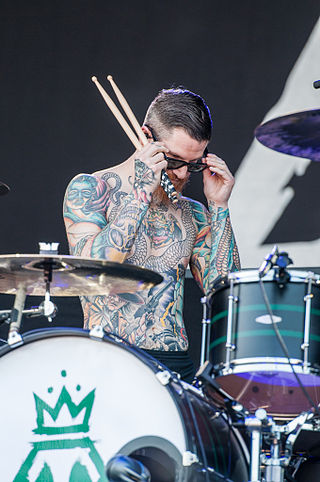
Andrew John Hurley is an American musician. He is the drummer for the rock band Fall Out Boy. Prior to Fall Out Boy, Hurley played in several hardcore punk bands. He joined Fall Out Boy as the full-time drummer in 2003 and was in the band's lineup until its hiatus in 2009. Following that, he formed the heavy metal supergroup The Damned Things with Fall Out Boy guitarist Joe Trohman; the group went on hiatus after its debut album, Ironiclast (2010), due to band members focusing on their original bands' new album cycles. Hurley moved on to hardcore punk band Enabler which released a debut album and toured in 2012.
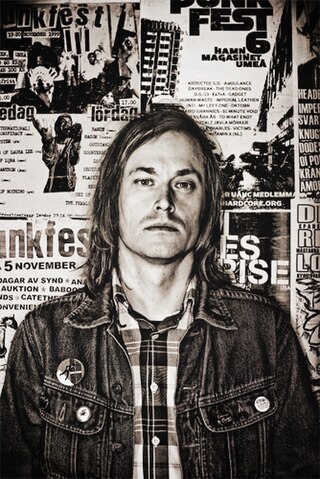
Sven Olov Dennis Lyxzén is a Swedish singer and songwriter, best known as the lead vocalist for influential Swedish hardcore punk band Refused, as well as the bands INVSN and Fake Names. He is also a former member of bands including AC4, Step Forward, Final Exit, and The (International) Noise Conspiracy, and co-founded the Swedish record labels Ny Våg and Desperate Fight Records.
Gang Green are an American punk rock band originally from Braintree, Massachusetts. Chris Doherty (guitar), Bill Manley (bass) and Mike Dean (drums) started the band in 1980 and broke up in 1983. Doherty reformed Gang Green the following year, and the band experienced numerous lineup changes until its dissolution for the second time in 1992. Doherty has been the band's only constant member and has kept Gang Green active from 2005 onwards. The band was influential in the formation of the East Coast hardcore punk scene, and went on to become one of the forerunners of crossover thrash and speed metal in the late 1980s.
Racetraitor is an American hardcore punk band originally from Chicago, Illinois. The band attracted controversy in the late 1990s, before any releases, as a result of their radical take on racial politics, which focused on ideas like systemic racism and white privilege before they were widely discussed topics in popular or underground culture. Racetraitor was also a key proto-metalcore act being one of the first few bands to incorporate extreme metal influences, such as death metal, grindcore, and doom metal, into hardcore.
"Straight Edge" is a track from Minor Threat's 1981 eponymous debut 7-inch EP, later reissued both as part of the 1984 collection Minor Threat, then as part of 1989's Complete Discography. The song was the inspiration for a movement in the punk subculture known as straight edge.
Chokehold is a Canadian vegan straight edge hardcore punk band from Hamilton, Ontario. They were active from 1990 to 1996, and came together again for a reunion tour in 2015, and five dates in Japan in September 2016. They released their third album in 2019.
Raid were a Tennessee based straight edge hardcore punk band that formed after the break-up of the hardcore band One Way. Raid were a part of the Hardline subculture, which combined the tenets of straight edge with militant veganism and environmentalism.
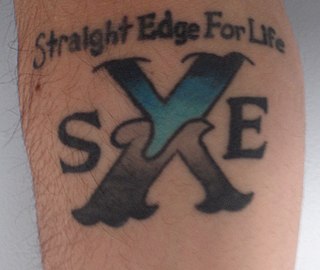
Straight edge is a subculture of hardcore punk whose adherents refrain from using alcohol, tobacco, and recreational drugs, in reaction to the excesses of punk subculture. Some adherents refrain from engaging in promiscuous sex, follow a vegetarian or vegan diet, and do not use caffeine or prescription drugs. The term "straight edge" was adopted from the 1981 song "Straight Edge" by the hardcore punk band Minor Threat.

Canadian hardcore punk originated in the early 1980s. It was harder, faster, and heavier than the Canadian punk rock that preceded it. Hardcore punk is a punk rock music genre and subculture that originated in the late 1970s. The origin of the term "hardcore punk" is uncertain. The Vancouver-based band D.O.A. may have helped to popularize the term with the title of their 1981 album, Hardcore '81. Hardcore historian Steven Blush said that the term "hardcore" is also a reference to the sense of being "fed up" with the existing punk and new wave music. Blush also states that the term refers to "an extreme: the absolute most Punk."An article in Drowned in Sound argues that 1980s-era "hardcore is the true spirit of punk", because "after all the poseurs and fashionistas fucked off to the next trend of skinny pink ties with New Romantic haircuts, singing wimpy lyrics", the punk scene consisted only of people "completely dedicated to the DIY ethics". One definition of the genre is "a form of exceptionally harsh punk rock."
Krishnacore is a subgenre of hardcore punk that draws inspiration from the Hare Krishna tradition. Although some hardcore punk bands had already made references to Krishna Consciousness in the 1980s, the subgenre was established in the early 1990s by the bands Shelter and 108. The name is a portmanteau of "Krishna" and "hardcore".
Animal rights are closely associated with two ideologies of the punk subculture: anarcho-punk and straight edge. This association dates back to the 1980s and has been expressed in areas that include song lyrics, benefit concerts for animal rights organisations, and militant actions of activists influenced by punk music. Among the latter, Rod Coronado, Peter Daniel Young and members of SHAC are notable. This issue spread into various punk rock and hardcore subgenres, e.g. crust punk, metalcore and grindcore, eventually becoming a distinctive feature of punk culture.










